China must rethink its hardline stance toward Taiwan, President Tsai Ing-wen (蔡英文) said in a BBC interview that aired yesterday, adding that the nation is already independent and that any invasion would be “very costly” for Beijing.
Tsai on Saturday last week won a second term with a record 8.2 million votes, an outcome that was seen as a forceful rebuke of China’s ongoing campaign to isolate the nation.
In her first interview since her re-election, Tsai told the BBC that there was no need to formally announce independence because the nation already runs itself.
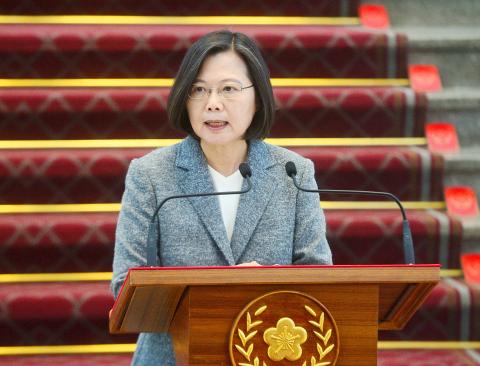
Photo: Wang Yi-sung, Taipei Times
“We don’t have a need to declare ourselves an independent state,” she said. “We are an independent country already and we call ourselves the Republic of China, Taiwan.”
“We have a separate identity and we’re a country of our own. We deserve respect from China,” Tsai said.
In the interview, which came as the nation held annual military drills in southern Taiwan, Tsai warned Beijing against sending in troops.
“Invading Taiwan is something that is going to be very costly for China,” she said.
Critics accuse Tsai of being needlessly antagonistic toward Beijing, but Tsai said that she had resisted pressure from within her own party to be more forceful on the issue of independence.
“There are so many pressures, so much pressure here that we should go further,” she said.
“Maintaining a ‘status quo’ remains our policy... I think that is a very friendly gesture to China.”
Tsai has repeatedly said that she is willing to talk to Beijing as long as there are no preconditions.
However, Beijing has refused, cutting off official communication with her administration.
Over the past four years, China has also has ramped up economic, military and diplomatic pressure, hoping it would scare voters into supporting the opposition, but its strong-arm tactics backfired with voters resoundingly backing Tsai for another four more years.
China yesterday responded to Tsai’s proposal for positive cross-strait interactions by reaffirming its adherence to the “1992 consensus.”
China’s Taiwan Affairs Office spokesman Ma Xiaoguang (馬曉光) said at the first news conference held by the office since Tsai was re-elected that the “1992 consensus” must be adhered to for the development of cross-strait relations.
“Shaking a mountain is easy, rocking the ‘1992 consensus’ is difficult,” Ma added.
In her acceptance speech on Saturday night, Tsai said that peace, parity, democracy and dialogue are the key to positive cross-strait interactions and long-term stable development.
In response, Ma yesterday said that when the Democratic Progressive Party took office in 2016, it refused to recognize the consensus.
This is the root cause of the deterioration in cross-strait relations, he said.
The Chinese Nationalist Party (KMT) and the Chinese Communist Party had since 2005 insisted on bolstering exchanges to promote the peaceful development of cross-strait relations based on the political foundation of the consensus and opposition to Taiwanese independence, and have achieved good results in this regard, Ma said.
Taiwan’s future lies in unification with China and the well-being of its people in national rejuvenation, Ma said, adding that Taiwanese compatriots are part of the Chinese people and Taiwan’s future should be decided by all Chinese.
The “1992 consensus” — a term former Mainland Affairs Council chairman Su Chi (蘇起) in 2006 admitted to making up in 2000 — refers to a tacit understanding between the KMT and the Chinese government that there is “one China,” with each side having its own interpretation of what “China” means.
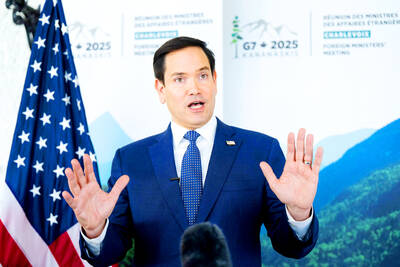
‘CROWN JEWEL’: Washington ‘can delay and deter’ Chinese President Xi Jinping’s plans for Taiwan, but it is ‘a very delicate situation there,’ the secretary of state said US President Donald Trump is opposed to any change to Taiwan’s “status quo” by force or extortion and would maintain that policy, US Secretary of State Marco Rubio told the Hugh Hewitt Show host on Wednesday. The US’ policy is to maintain Taiwan’s “status quo” and to oppose any changes in the situation by force or extortion, Rubio said. Hewitt asked Rubio about the significance of Trump earlier this month speaking with Taiwan Semiconductor Manufacturing Co (台積電) chairman C.C. Wei (魏哲家) at the White House, a meeting that Hewitt described as a “big deal.” Asked whether the meeting was an indication of the
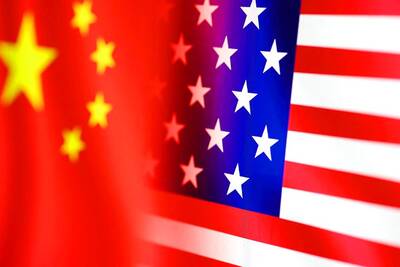
‘RELATIVELY STRONG LANGUAGE’: An expert said the state department has not softened its language on China and was ‘probably a little more Taiwan supportive’ China’s latest drills near Taiwan on Monday were “brazen and irresponsible threats,” a US Department of State spokesperson said on Tuesday, while reiterating Washington’s decades-long support of Taipei. “China cannot credibly claim to be a ‘force for stability in a turbulent world’ while issuing brazen and irresponsible threats toward Taiwan,” the unnamed spokesperson said in an e-mailed response to media queries. Washington’s enduring commitment to Taiwan will continue as it has for 45 years and the US “will continue to support Taiwan in the face of China’s military, economic, informational and diplomatic pressure campaign,” the e-mail said. “Alongside our international partners, we firmly
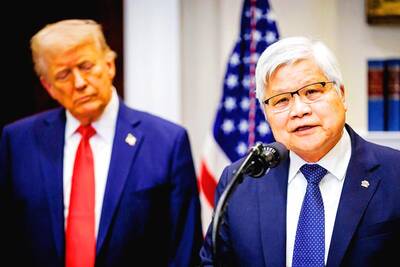
KAOHSIUNG CEREMONY: The contract chipmaker is planning to build 5 fabs in the southern city to gradually expand its 2-nanometer chip capacity Taiwan Semiconductor Manufacturing Co (TSMC, 台積電), the world’s biggest contract chipmaker, yesterday confirmed that it plans to hold a ceremony on March 31 to unveil a capacity expansion plan for its most advanced 2-nanometer chips in Kaohsiung, demonstrating its commitment to further investment at home. The ceremony is to be hosted by TSMC cochief operating officer Y.P. Chyn (秦永沛). It did not disclose whether Premier Cho Jung-tai (卓榮泰) and high-ranking government officials would attend the ceremony. More details are to be released next week, it said. The chipmaker’s latest move came after its announcement earlier this month of an additional US$100 billion
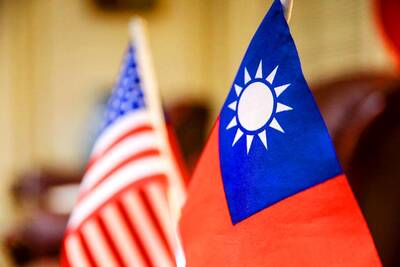
COUNTERING THE PLA: While the US should reinforce its relations with partners and allies, Taiwan must invest in strengthening its defenses as well, Phillip Davidson said If influence in the Indo-Pacific region is one of the US’ core interests, then Taiwan serves as a cornerstone of US economic and security influence in the region, former US Indo-Pacific Command commander admiral Phillip Davidson said on Thursday. “China’s ... strategy is to supplant the US leadership role in the international order ... and they’ve long said ... that they intend to do that by 2050,” Davidson told the National Review Institute’s Ideas Summit in Washington. Davidson said he had previously told US Senate hearings on China’s military activities and possible threats in the Indo-Pacific region that a Chinese invasion of